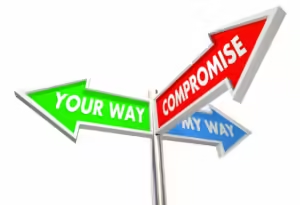In a world characterized by rapid change, technological advancements, and increasingly complex global challenges, one would think that humanity would unite to tackle issues collaboratively. Instead, we often find ourselves embroiled in large and small conflicts where the primary aim is to win at all costs. The loss of the ability to compromise is a problem that affects not just our local communities but resonates globally, creating divides that seem impossible. This blog post explores why we have lost this crucial ability and what it means for our collective future.
The Importance of Compromise
To understand the gravity of our current predicament, it’s essential first to recognize compromise’s vital role in human interaction. Compromise is the cornerstone of healthy relationships, effective governance, and scientific progress. It allows us to find a middle ground, satisfy differing needs, and build more robust solutions because they consider multiple viewpoints.
Historically, some of the most significant achievements and lasting peace treaties have come through the art of compromise. Think of the U.S. Constitution, a document rooted in the necessity of balancing various factions to create a functioning and stable government. Or think about NATO, which, despite its challenges, demonstrates a collective commitment to mutual defense and security.
The Erosion of Compromise
Why, then, has our ability to compromise deteriorated? Multiple factors contribute to this decline:
- Polarization: The increasing political, social, and ideological polarization within countries and across the globe makes compromise nearly impossible. The rise of echo chambers, fueled by social media algorithms, has created isolated communities where differing views are rarely heard, let alone respected.
- Globalization’s Uneven Benefits: While globalization has yielded numerous benefits, these have not been evenly distributed. The resulting economic inequalities have cultivated resentment and mistrust among various societal groups, fostering a zero-sum mentality.
- Leadership Styles: Modern leadership often champions decisiveness and an uncompromising virtue stance. While this can be effective in specific scenarios, it generally undermines the ability to engage in nuanced dialogue and reach mutually beneficial outcomes.
- Media Influence: The media often portrays conflicts and negotiations in a binary fashion—winners versus losers. This kind of framing discourages the public from appreciating the subtleties of compromise.
- Cultural Shifts: Over time, cultural narratives have increasingly glorified individual achievement and personal gain over community well-being and collective success. This shift has eroded the communal mindset that underpins successful compromise.
Real-World Implications
The loss of the ability to compromise is not merely an abstract issue; it has far-reaching implications:
- Political Gridlock: In many democratic countries, the inability to compromise has led to legislative gridlock. Essential policies, which could address critical issues such as healthcare and economic inequality, remain mired in partisan deadlock.
- Social Tensions: On a social level, the inability to compromise exacerbates tensions, undermining the social fabric. Communities become divided, with groups holding opposing views unable to coexist peacefully.
- International Relations: On the global stage, the failure to compromise has led to deteriorating diplomatic relationships, increasing the likelihood of conflicts and stunting progress on global challenges like poverty and terrorism.
Paths to Rediscovery
Restoring our ability to compromise will not be easy, but it is not impossible. Here are some strategies that can help:
- Education: Integrating negotiation, empathy, and conflict resolution courses into educational curricula can equip future generations with the tools needed for effective compromise.
- Media Responsibility: News outlets can make a conscious effort to portray conflicts and solutions more balanced, highlighting successful compromises and collaborative efforts.
- Policy Reforms: Governments can introduce mechanisms that encourage bipartisan support, ensuring that consensus drives policy-making more than confrontation.
- Civic Engagement: Encouraging civic engagement through community programs and local initiatives can bridge divides. By working together on common goals, people are more likely to see the value in compromising.
- Leadership Change: Electing leaders who value dialogue, inclusiveness, and mutual respect can set a tone from the top, fostering a culture prioritizing compromise over contention.
Conclusion
The ability to compromise is not a sign of weakness but a testament to our collective strength. It reflects our capacity to understand, appreciate, and incorporate diverse perspectives to build a more harmonious and practical world. While current affairs might paint a bleak picture, history has shown that humanity is resilient. By recognizing the importance of compromise and actively working to restore it, we can hope to navigate the complexities of the modern world more effectively, ensuring a future where progress is not stifled by division but propelled by unity.

